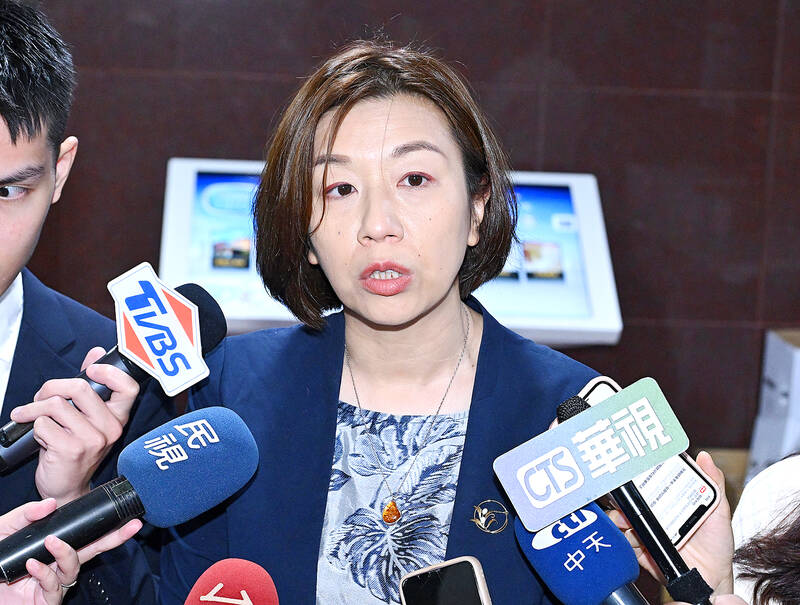The Ministry of Health and Welfare (MOHW) on Friday said it is mulling creating regulations forbidding aesthetic medicine practitioners from using phrases such as “sleeping comfortably” to gloss over the dangers of general anesthesia.
The ministry said it was made aware of a recent case in which a 40-year-old female visited a clinic in Taipei’s Zhongshan District (中山) for a thermage comfort pulse technology (CPT) session, but experienced insufficient oxygen saturation after general anesthesia and was pronounced dead after being taken to a hospital.
Deputy Minister of Health and Welfare Lin Ching-yi (林靜儀) said the ministry concluded that phrasing general anesthesia as shu mian (舒眠), “or acts to help one sleep more comfortably,” was misleading.

Photo: Liao Chen-huei, Taipei Times
The public should be aware that anesthesia is invasive and comes with certain risks, and the ministry would implement regulations banning the use of phrasings that insinuate that anesthesia is like going to sleep, she said.
Anesthesiologists must assess the risks of administering anesthesia prior to surgeries, and consent form must be signed, Lin said.
The number of anesthesiologists should not be an issue, but the medical industry was more lacking in qualified surgeons, she said, adding that the ministry would launch a review to find out if there are instances of a shortage of anesthesiologists for surgeries and emergency medicine.
Commenting on the Legislative Yuan’s proposal that cardiovascular surgeons and transplant surgery doctors be allowed to approve the use of anesthetics after training, Lin said the ministry would discuss the proposals with the Taiwan Society of Anesthesiologists before arriving at a decision.
Regarding whether there is a shortage of anesthesiologists, Lin said the industry should discuss what procedures require anesthesia and if there are enough anesthesiologists before the issue can be addressed.
Anesthesiologists should be dispatched to emergency medicine or other surgical procedures based on their scale, difficulty and necessity, but there are already special committees that handle that distribution, Lin said.
The aesthetic medicine industry should seek professional assistance should there be non-necessary services that require anesthesia, she said.
Many young doctors enter aesthetic medicine after their postgraduate year of training without further specialized training, Lin said, adding that that was a worrisome development.
The Regulations for Using Specialized Equipment for Medical Examinations (特定醫療技術檢查檢驗醫療儀器施行或使用管理辦法) state that invasive or highly technical operations must be conducted by certified dermatologists or plastic surgeons.
Lin said that aesthetic medicine remains an industry where implementing government oversight is difficult and, at present, the government can only ask that the industry police itself and maintain high standards.

The first global hotel Keys Selection by the Michelin Guide includes four hotels in Taiwan, Michelin announced yesterday. All four received the “Michelin One Key,” indicating guests are to experience a “very special stay” at any of the locations as the establishments are “a true gem with personality. Service always goes the extra mile, and the hotel provides much more than others in its price range.” Of the four hotels, three are located in Taipei and one in Taichung. In Taipei, the One Key accolades were awarded to the Capella Taipei, Kimpton Da An Taipei and Mandarin Oriental Taipei. Capella Taipei was described by

EVA Airways today confirmed the death of a flight attendant on Saturday upon their return to Taiwan and said an internal investigation has been launched, as criticism mounted over a social media post accusing the airline of failing to offer sufficient employee protections. According to the post, the flight attendant complained of feeling sick on board a flight, but was unable to take sick leave or access medical care. The crew member allegedly did not receive assistance from the chief purser, who failed to heed their requests for medical attention or call an ambulance once the flight landed, the post said. As sick

The Taichung District Court yesterday confirmed its final ruling that the marriage between teenage heir Lai (賴) and a man surnamed Hsia (夏) was legally invalid, preventing Hsia from inheriting Lai’s NT$500 million (US$16.37 million) estate. The court confirmed that Hsia chose not to appeal the civil judgement after the court handed down its ruling in June, making the decision final. In the June ruling, the court said that Lai, 18, and Hsia, 26, showed “no mutual admiration before the marriage” and that their interactions were “distant and unfamiliar.” The judge concluded that the couple lacked the “true intention of

INDUSTRY: Beijing’s latest export measures go beyond targeting the US and would likely affect any country that uses Chinese rare earths or related tech, an academic said Taiwanese industries could face significant disruption from China’s newly tightened export controls on rare earth elements, as much of Taiwan’s supply indirectly depends on Chinese materials processed in Japan, a local expert said yesterday. Kristy Hsu (徐遵慈), director of the Taiwan ASEAN Studies Center at the Chung-Hua Institution for Economic Research, said that China’s latest export measures go far beyond targeting the US and would likely affect any country that uses Chinese rare earths or related technologies. With Japan and Southeast Asian countries among those expected to be hit, Taiwan could feel the impact through its reliance on Japanese-made semi-finished products and